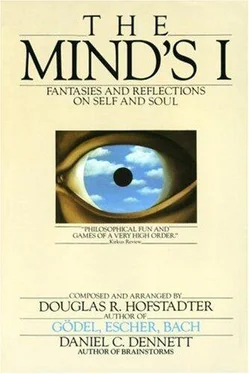This special property of digital computers, that they can mimic any discrete machine, is described by saying that they are universal machines. The existence of machines with this property has the important consequence that, considerations of speed apart, it is unnecessary to design various new machines to do various computing processes. They can all be done with one digital computer, suitably programmed for each case. It will be seen that as a consequence of this all digital computers are in a sense equivalent.
Contrary View on the Main Question
We may now consider the ground to have been cleared and we are ready to proceed to the debate on our question “Can machines think?”
… We cannot altogether abandon our original form of the problem, for opinions will differ as to the appropriateness of the substitution and we must at least listen to what has to be said in this connection.
It will simplify matters for the reader if I explain first my own beliefs in the matter. Consider first the more accurate form of the question. I believe that in about fifty years time it will be possible to program computers, with a storage capacity of about 10 9, to make them play the imitation game so well that an average interrogator will not have more that 70 percent chance of making the right identification after five minutes of questioning. The original question, “Can machines think?” I believe to be too meaningless to deserve discussion. Nevertheless I believe that at the end of the century the use of words and general educated opinion will have altered so much that one will be able to speak of machines thinking without expecting to be contradicted. I believe further that no useful purpose is served by concealing these beliefs. The popular view is that scientists proceed inexorably from well-established fact to well-established fact, never being influenced by any unproved conjecture is quite mistaken. Provided it is made clear which are proved facts and which are conjectures, no harm can result. Conjectures are of great importance since they suggest useful lines of research.
I now proceed to consider opinions opposed to my own.
1. The theological objection. Thinking is a function of man’s immortal soul. God has given an immortal soul to every man and woman, but not to any other animal or machines. Hence no animal or machine can think. [6] Possibly this view is heretical. St Thomas Aquinas ( Summa Theologica, quoted by Bertrand Russell, A History of Western Philosophy [New York: Simon and Schuster, 1945], p. 458) states that God cannot make man to have no soul. But this may not be a real restriction on His powers, but only a result of the fact that men’s souls are immortal and therefore indestructible.
I am unable to accept any part of this, but will attempt to reply in theological terms. I should find this argument more convincing if animals were classed with men, for there is a greater difference, to my mind, between the typical animate and the inanimate than there is between man and the other animals. The arbitrary character of the orthodox view becomes clearer if we consider how it might appear to a member of some other religious community? How do Christians regard the Moslem view that women have no souls? But let us leave this point aside and return to the main argument. It appears to me that the argument quoted above implies a serious restriction to the omnipotence of the Almighty. It is admitted that there are certain things He cannot do such as making one equal to two, but should we not believe that He has freedom to confer a soul on an elephant if He sees fit? We might expect that He would only exercise this power in conjunction with a mutation which provided the elephant with an appropriately improved brain to minister to the need of this soul. An argument of exactly similar form may be made for the case of machines. It may seem different because it is more difficult to “swallow.” But this really only means that we think it would be less likely that He would consider the circumstances suitable for conferring a soul. The circumstances in question are discussed in the rest of this paper. In attempting to construct such machines we should not be irreverently usurping His power of creating souls, any more than we are in the procreation of children, rather, we are, in either case, instruments of His will providing mansions for the souls that He creates.
However, this is mere speculation. I am not very impressed with theological arguments whatever they may be used to support. Such arguments have often been found unsatisfactory in the past. In the time of Galileo it was argued that the texts, “And the sun stood still… and hasted not to go down about a whole day” (Joshua x. 13) and “He laid the foundation of the earth, that it should not move at any time” (Psalm cv. 5) were an adequate refutation of the Copernican theory. With our present knowledge such an argument appears futile. When that knowledge was not available it made quite a different impression.
2. The “Heads in the Sand” Objection. “The consequences of machines thinking would be too dreadful. Let us hope and believe that they cannot do so.”
This argument is seldom expressed quite so openly as in the form above. But it affects most of us who think about it at all. We like to believe that Man is in some subtle way superior to the rest of creation. It is best if he can be shown to be necessarily superior, for then there is no danger of him losing his commanding position. The popularity of the theological argument is clearly connected with this feeling. It is likely to be quite strong in intellectual people, since they value the power of thinking more highly than others, and are more inclined to base their belief in the superiority of Man on this power.
I do not think this argument is sufficiently substantial to require refutation. Consolation would be more appropriate: perhaps this should be sought in the transmigration of souls.
3. The Mathematical Objection. There are a number of results of mathematical logic which can be used to show that there are limitations to the powers of discrete state machines. The best known of these results is known as Gödel’s theorem, and shows that in any sufficiently powerful logical system statements can be formulated which can neither be proved nor disproved within the system, unless possibly the system itself is inconsistent. There are other, in some respects similar, results due to Church, Kleene, Roser and Turing. The latter result is the most convenient to consider, since it refers directly to machines, whereas the others can only be used in a comparatively indirect argument: for instance if Gödel’s theorem is to be used we need in addition to have some means of describing logical systems in terms of machines, and machines in terms of logical systems. The result in question refers to a type of machine which is essentially a digital computer with an infinite capacity. It states that there are certain things that such a machine cannot do. If it is rigged up to give answers to questions as in the imitation game, there will be some questions to which it will either give a wrong answer, or fail to give an answer at all however much time is allowed for a reply. There may, of course, be many such questions and questions which cannot be answered by one machine may be satisfactorily answered by another. We are of course supposing for the present that the questions are of the kind to which an answer “Yes” or “No” is appropriate, rather than questions such as “What do you think of Picasso?” The questions that we know the machines must fail on are of this type. “Consider the machine specified as follows… Will this machine ever answer “Yes” to any question?” The dots are to be replaced by a description of some machine in a standard form… When the machine described bears a certain comparatively simple relation to the machine which is under interrogation, it can be shown that the answer is either wrong or not forthcoming. This is the mathematical result: it is argued that it proves a disability of machines to which the human intellect is not subject.
Читать дальше











